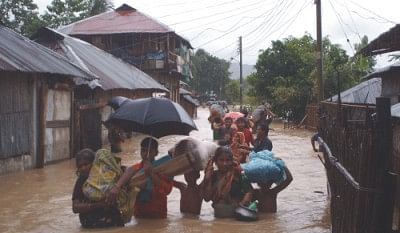Road to climate change risk reduction

One of the UK's best known scientists, Professor James Lovelock, says only a catastrophe will prompt the world to tackle the threat of climate change seriously. He also said: "In the late 1930s when I was a student we knew that war was imminent, but there was no clear idea of what to do about it. We think that something unpleasant may soon happen but we are still as confused over what to do about it as we were in 1938.Our response so far is just an attempt to appease. The Kyoto agreement is uncannily like that of Munich, with politicians out of show that they do response but in reality are bidding for time."
In this context, Bangladesh is the most vulnerable country in the world on climate change issues. Until a few years ago, the words Tsunami, Sidr, Aila etc were virtually unknown in our country, but now there can be few who do not know what awesome consequences can result from such natural disasters. In addition, the rising sea water would penetrate the country's fertile land and ruin thousands of hectares of cultivable land in the coastal areas. There would be no existence of the Sunderbans (the world's largest mangrove forest and well recognised world heritage site) which would bring a great ecological imbalance. Just imagine how many rare species of flora and fauna would be lost forever!
There is no doubt that man made changes in the environment are influencing climate change and that it is high time for urgent action also by humans (governments and individuals) to check it. Our government, however, has taken climate change strategy and action plan, adaptation action plan, risk management and reduction activities on climate change issues. But we have to act as quickly as possible for effective results.
Bangladesh's population is expected to increase by 130 million more people over the next 50 years. Climate change would likely exacerbate present environmental conditions that give rise to land degradation, shortfall in food production leading to rural poverty and urban unrest. About 15,000 Himalayan glaciers form a unique reservoir which supports perennial rivers such as the Indus, Ganges and Brahmaputra which, in turn, are the life line of millions of people in the sub-continent.
Bangladesh is already experiencing the adverse impacts of global warming and climate change. The impacts have been observed as -- change in rainfall patterns, increased frequency and severity of floods, droughts, storms, heat waves, besides sea level rise in the south and glacial melt on the north, etc. The socio-economic impacts of these changes are observed in the following sectors -- water resources, agriculture and forestry, food security, human health, also infrastructure and settlements e.g. displacement of inhabitants and loss of livelihood.
Next December the climate change conference is going to be held in Copenhagen. We hopefully look forward to its fruitful outcome. It is necessary that as early as possible global political leaders, heads of state and policy makers resolve the following important questions: 01.How much more can industrial or developed countries cut emission? 02. How much can developing countries slow the growth of their own? 03. How much money does the global community need to raise to help poor countries survive the effects of climate change?
Meanwhile, it is heartening to note that the European Union has agreed on an euro 100 billion fund for poor countries. Climate change risk reduction is a collective responsibility of all who inhabit the planet. It needs collective action. Otherwise we cannot control environmental catastrophe anywhere.

 For all latest news, follow The Daily Star's Google News channel.
For all latest news, follow The Daily Star's Google News channel. 



Comments